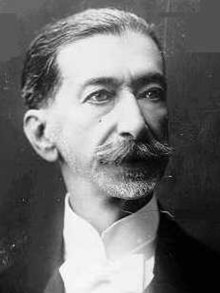Borges de Medeiros
(Redirected from Antônio Augusto Borges de Medeiros)
Borges de Medeiros | |
|---|---|
 | |
| President of Rio Grande do Sul | |
| In office 25 January 1913 – 25 January 1928 | |
| Preceded by | Carlos Barbosa Gonçalves |
| Succeeded by | Getúlio Vargas |
| In office 25 January 1898 – 25 January 1908 | |
| Preceded by | Júlio de Castilhos |
| Succeeded by | Carlos Barbosa Gonçalves |
| Member of the Chamber of Deputies | |
| In office 6 July 1935 – 10 November 1937 | |
| Constituency | Rio Grande do Sul |
| In office 15 November 1890 – 31 December 1892 | |
| Constituency | Rio Grande do Sul |
| Personal details | |
| Born | 19 November 1863 Caçapava do Sul, Rio Grande do Sul, Brazil |
| Died | 25 May 1961 (aged 97) Porto Alegre, Rio Grande do Sul, Brazil |
| Political party | PRR (1882–1937) UDN (1945–1961) |
| Spouse |
Carlinda Gonçalves Borges
(m. 1889; died 1957) |
| Parents |
|
| Alma mater | Faculty of Law of Recife |
| Occupation | Editor of A Federação |
| Profession |
|
| Military service | |
| Allegiance | Brazil |
| Years of service | 1893–1895 |
| Rank | Lieutenant colonel |
| Battles/wars | Federalist Revolution |
Antônio Augusto Borges de Medeiros (19 November 1863 – 25 April 1961) was a Brazilian lawyer, judge, and politician. He served as Chief Judge and was appointed as the President of Rio Grande do Sul for a total of 25 years (1898–1908 and 1913–1928), during the period of Brazilian history known as the República Velha.[1] He "inherited" the presidency from Júlio de Castilhos, the local dictator against whom the 1893 Federalist Revolutionhad been fought.[2] Supporters of Borges de Medeiros were known as borgistas.[3]
Medeiros was born in Caçapava do Sul. He ran in the presidential election of 1934, but was defeated by President Getúlio Vargas. He died in Porto Alegre, aged 97.
References[edit]
- ^ Hentschke, J. (2006-12-11). Vargas and Brazil: New Perspectives. Springer. p. 38. ISBN 978-0-230-60175-8.
- ^ Machado, Roberto Pinheiro (2018-06-11). Brazilian History: Culture, Society, Politics 1500-2010. Cambridge Scholars Publishing. p. 162. ISBN 978-1-5275-1209-2.
- ^ Hentschke, J. (2006-12-11). Vargas and Brazil: New Perspectives. Springer. p. 294. ISBN 978-0-230-60175-8.
